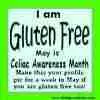-
Welcome to Celiac.com!
You have found your celiac tribe! Join us and ask questions in our forum, share your story, and connect with others.
-
Celiac.com Sponsor (A1):
Celiac.com Sponsor (A1-M):
-
Get Celiac.com Updates:Support Our Content
Thyroid Reactions To Casein?
-
Get Celiac.com Updates:Support Celiac.com:
-
Celiac.com Sponsor (A17):
Celiac.com Sponsor (A17):
Celiac.com Sponsors (A17-M):
-
Recent Activity
-
- knitty kitty replied to catnapt's topic in Celiac Disease Pre-Diagnosis, Testing & Symptoms3
results from 13 day gluten challenge - does this mean I can't have celiac?
@catnapt, Wheat germ has very little gluten in it. Gluten is the carbohydrate storage protein, what the flour is made from, the fluffy part. Just like with beans, there's the baby plant that will germinate ("germ"-inate) if sprouted, and the bean part is the carbohydrate storage protein. Wheat germ is the baby plant inside a kernel of wheat... -
- knitty kitty replied to Scott Adams's topic in Post Diagnosis, Recovery & Treatment of Celiac Disease49
Supplements for those Diagnosed with Celiac Disease
Hello, @asaT, I'm curious to know whether you are taking other B vitamins like Thiamine B1 and Niacin B3. Malabsorption in Celiac disease affects all the water soluble B vitamins and Vitamin C. Thiamine and Niacin are required to produce energy for all the homocysteine lowering reactions provided by Folate, Cobalamine and Pyridoxine. Weight... -
- Florence Lillian replied to Jane02's topic in Gluten-Free Foods, Products, Shopping & Medications11
Desperately need a vitamin D supplement. I've reacted to most brands I've tried.
Hi Jane: You may want to try the D3 I now take. I have reactions to fillers and many additives. Sports Research, it is based in the USA and I have had no bad reactions with this brand. The D3 does have coconut oil but it is non GMO, it is Gluten free, Soy free, Soybean free and Safflower oil free. I have a cupboard full of supplements that did not agree... -
- catnapt replied to catnapt's topic in Celiac Disease Pre-Diagnosis, Testing & Symptoms3
results from 13 day gluten challenge - does this mean I can't have celiac?
highly unlikely NOTHING and I mean NOTHING else has ever caused me these kinds of symptoms I have no problem with dates, they are a large part of my diet In fact, I eat a very high fiber, very high vegetable and bean diet and have for many years now. It's considered a whole foods plant based or plant forward diet (I do now eat some lean... -
- cristiana replied to hjayne19's topic in Post Diagnosis, Recovery & Treatment of Celiac Disease21
Insomnia help
Thank you for your post, @nanny marley It is interesting what you say about 'It's OK not to sleep'. Worrying about sleeping only makes it much harder to sleep. One of my relatives is an insomniac and I am sure that is part of the problem. Whereas I once had a neighbour who, if she couldn't sleep, would simply get up again, make a cup of tea, read,...
-




Recommended Posts
Archived
This topic is now archived and is closed to further replies.